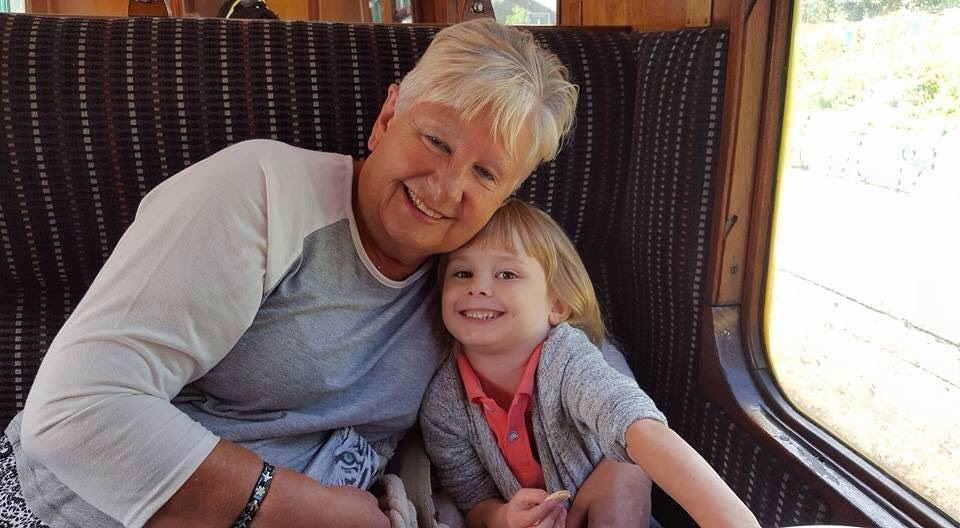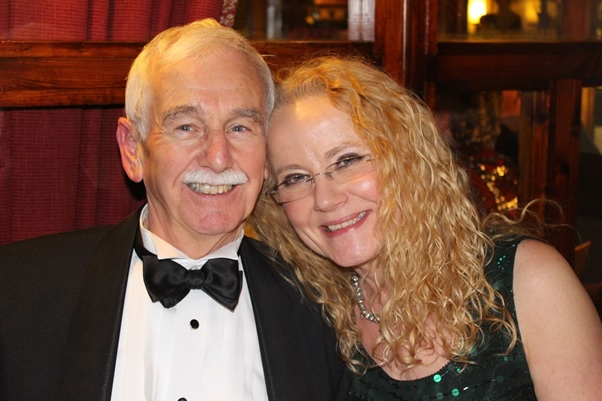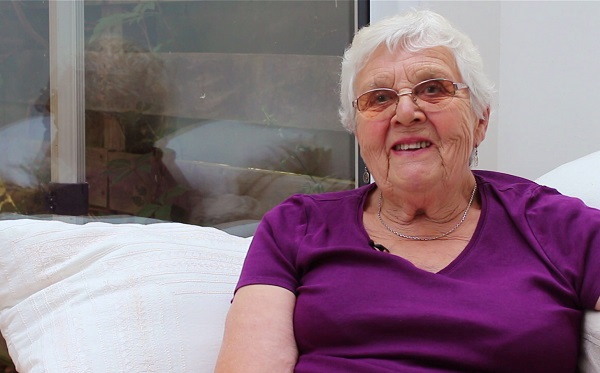How Long Can You Have Lymphoma Without Knowing
What is agile monitoring?
Sometimes, lymphoma doesn't need treatment straightaway. Instead, you have regular bank check-ups with your medical team to monitor your health and to run into how the lymphoma is affecting you. You don't offset treatment unless the lymphoma begins to crusade significant wellness issues. This approach is called 'active monitoring' or 'agile surveillance'. You might as well hear it chosen 'watch and look':
- 'lookout' because you take regular check-ups (monitoring)
- 'look' because you don't start treatment unless your lymphoma starts to cause issues or your symptoms become hard to cope with.
Lookout Professor Simon Rule explicate what active monitoring is and why information technology is often recommended for low-class non-Hodgkin lymphoma
Active monitoring is a common approach for low-grade (wearisome-growing) types of lymphoma. These can be difficult to cure completely just they can frequently be controlled for many years, merely needing treatment from time-to-fourth dimension.
If you lot accept low-grade lymphoma that isn't causing bothersome symptoms, you might accept active monitoring when yous are first diagnosed with lymphoma, or after y'all've had a course of treatment that hasn't completely got rid of the lymphoma.
Agile monitoring means that, for your type of lymphoma, there is no benefit in starting treatment before information technology is needed.
It does not mean that:
- in that location is no treatment available for your lymphoma
- you lot are too quondam to be treated, or that
- your doctors are trying to save money on your treatment.

For near people, one time the shock of a cancer diagnosis has sunk in, yous expect the next phase to be treatment, probably chemotherapy. When it'due south suggested nosotros will watch and await, lots of thoughts flood your imagination, similar is my cancer also advanced for treatment? But I've now avoided chemotherapy for more than than 10 years.
Dorsum to top
Why might I have agile monitoring?
If you have slow-growing lymphoma that isn't causing bothersome symptoms, there are several advantages to having active monitoring instead of firsthand treatment:
- y'all avoid side effects or late effects from treatment for as long as possible
- you only need to go to hospital appointments for outpatient check-ups
- near people savor a good quality of life.
Active monitoring helps you lot avoid unnecessary treatment. Information technology is unlikely to impact the outcome of low-grade lymphoma.
- Treating you before the lymphoma is causing problems does not make you live longer.
- Being on active monitoring does not increase the risk that your lymphoma will change (transform) to a faster-growing type.
- Treatment is just equally effective if you salvage information technology until information technology is needed.

I have no desire to have treatment for something when, overall, I am pretty well. I would rather salve information technology for when I actually need information technology. And then, if the problem returns, I should all the same be able to have treatment.
Back to top
Who might have active monitoring?
Your medical team might propose active monitoring if you lot have one of the following types of depression-class lymphoma:
- follicular lymphoma (except grade 3B)
- marginal zone lymphomas (MALT lymphoma, splenic marginal zone lymphoma or nodal marginal zone lymphoma)
- Waldenström'south macroglobulinaemia (lymphoplasmacytic lymphoma)
- chronic lymphocytic leukaemia (CLL) / minor lymphocytic lymphoma (SLL).
Curtain jail cell lymphoma is usually fast-growing, only some people take a slow-growing ('indolent') form. If you take slow-growing mantle jail cell lymphoma that isn't causing bothersome symptoms, your medical team might suggest a menstruation of agile monitoring. Well-nigh people need treatment at some signal, but this might not exist for months or, rarely, years.
Some people with nodular lymphocyte-predominant Hodgkin lymphoma (NLPHL) also have active monitoring. This might exist before handling, or after surgery or radiotherapy to affected lymph nodes. NLPHL is an uncommon and usually wearisome-growing type of Hodgkin lymphoma.
Your medical team will only recommend active monitoring if:
- y'all accept a tedious-growing type of lymphoma
- you are generally well
- your lymphoma isn't causing symptoms that you lot find difficult to cope with
- your lymph nodes aren't likewise swollen and are non growing very quickly
- your blood tests don't observe any meaning problems
- none of your major organs (for case, heart, lungs, kidneys) are being affected by the lymphoma.
Because your lymphatic system runs throughout your body, it is mutual for lymphoma to exist at an advanced stage when information technology is diagnosed. Active monitoring can be suitable for people with avant-garde stage lymphoma.
You can watch personal feel videos of people on agile monitoring for dissimilar types of lymphoma on our active monitoring playlist.
Are in that location any other options?
Active monitoring might not be the only pick suitable for you. Your medical team should discuss all your handling options and help you determine which is all-time for you.
If you have stage 3 or 4 follicular lymphoma that isn't causing bothersome symptoms, your medical squad might suggest that you lot take a short course of rituximab earlier you proceed to active monitoring. This could assistance delay the need for chemotherapy or radiotherapy.
Back to top
What happens on agile monitoring?
If yous are on active monitoring, you lot accept regular check-ups with your dr., clinical nurse specialist or another member of your medical team to brand sure your lymphoma doesn't need treatment even so.
They talk to you lot about how you're feeling and whether you've noticed a change in your symptoms or any new symptoms. They might also:
- feel your tummy (abdomen), armpits, groin and neck to check for enlarged lymph nodes or other signs that your lymphoma may need handling
- measure your temperature, pulse, blood pressure and weight
- listen to your heart and lungs.
You are likely to have blood tests to check your blood count, look for signs of inflammation or infection, and make sure your bone marrow, liver and kidneys are working equally they should be. You won't commonly have a browse unless your medical squad suspects your lymphoma is growing to reduce your exposure to unnecessary radiations.
Your medical squad too bank check for whatsoever signs your lymphoma might take changed (transformed) into a faster-growing blazon. If they think it might take done, you are probable to take a biopsy to check. Your lymphoma is very unlikely to have transformed if your symptoms haven't changed.
Your follow-up appointments are usually every couple of months for the first yr, then every 3 to 6 months if your lymphoma hasn't got worse.
If your symptoms have changed or you're worried about your lymphoma, contact your medical squad. Don't wait for your side by side appointment.
Dorsum to top
When should I contact my medical team?
Contact your medical team straightaway if yous observe a change in your symptoms or any new symptoms. They can reassure yous or see you sooner if necessary.
A change in symptoms doesn't necessarily mean your lymphoma has got worse. Lymph nodes tin peachy for lots of reasons, or you might have another health status that is causing problems. If yous develop new symptoms, your medical squad might monitor your health closely for a while. They might run tests to decide whether or not your symptoms are due to the lymphoma.
Remember that yous are on active monitoring considering y'all have a slow-growing type of lymphoma, so urgent treatment is rarely needed even if you get-go to develop symptoms.
Dorsum to pinnacle
When volition I start handling?
It can be hard to predict how long it might exist until you need treatment. It varies a lot depending on the type of lymphoma you have and your individual circumstances. Some people need treatment before long after diagnosis or a treatment course, simply others don't demand treatment for many years. Some people never need treatment.
Your medical team are likely to suggest treatment if:
- your symptoms go difficult to cope with
- you lot develop 'B symptoms' (dark sweats, weight loss and fevers)
- your lymph nodes or spleen start to grow quickly or y'all develop bloated lymph nodes in new places
- your blood tests or other test results prove that lymphoma is affecting your major organs or is growing in your os marrow.
If your medical team retrieve you lot need to start treatment, they tin can explain why and discuss the handling options with you.

My medical team have always been there for me – doctors and peradventure more importantly, the specialist nurses. I like the style they have ever involved me in decision making. All that sort of input has helped me to be relaxed about non treatment and 'watch and wait'.
Dorsum to top
Living with active monitoring
Living with cancer tin be challenging, and active monitoring tin bring a range of feelings and emotions. Some people feel relieved that they don't demand to offset handling straightaway. Others find information technology hard to first be told they have lymphoma, only to then be recommended active monitoring.

I found information technology useful to join back up groups, webinars and Facebook groups. In time, I learnt to become a 'new me'.
Family and friends might as well notice the approach difficult to understand. Information technology tin be an additional claiming to have to bargain with other people's emotions as well every bit your own. You lot could signpost them to our information about active monitoring, instead of having to explain it yourself. Retrieve as well that our helpline team are here to back up both y'all, and those close to yous.
Speak to your medical squad for communication about how they tin support yous. They tin can assistance to identify and accost your concrete, practical, emotional and social needs. This is sometimes chosen a holistic needs assessment (HNA). Macmillan Cancer Support produce a booklet called Holistic Needs Cess: Planning your care and back up, which is free to download or order.
Many people find that they are able to suit well to beingness on active monitoring. Some people find it helps to think of their lymphoma as existence a long-term (chronic) illness to manage and live with, a bit like diabetes or loftier claret pressure.
Agile monitoring is counter-intuitive: 'I have cancer, but it'south non being treated.' There is no physical boxing, just there is a psychological challenge.
What can I do to assistance myself?
Look later on your general health and wellbeing. This includes eating a healthy diet, keeping active, not smoking and limiting your alcohol intake. As well as improving how you experience physically and emotionally, these lifestyle factors can assist to set you for any treatment you lot might need in the hereafter. It's too important to go to whatever medical appointments or screening tests you're invited to, as well every bit to accept whatsoever vaccinations your medical team advise. Speak to a fellow member of your medical team if yous take questions or concerns – don't wait until your next planned engagement.
Think near what helps lower your stress and anxiety levels. This might include, for example:
- Meditation techniques, such as yoga and mindfulness, which aim to calm the body and mind.
- A complementary therapy, such every bit acupuncture and massage to meliorate your mental wellbeing (though does not treat your lymphoma).
- Setting aside 'worry time' to remember about whatsoever fears or concerns y'all have and what you can or cannot practise about them. Although it can have practice, some people observe that it helps stop worrying thoughts from being on their listen all the time.
- Using cocky-assistance resources. The NHS website has information and tips on managing anxiety, fright and panic. Mental health charities also offering a range of resources such as guides and podcasts. For instance, Listen has information near feet, including self-intendance tips, and No Panic has a number of mental wellbeing resource.
Show yourself patience and kindness. There might be days when you struggle emotionally. Remember that ups and downs are natural. However, if y'all experience low mood or difficulties sleeping that keep for a while, speak to your GP or clinical nurse specialist for back up.
Although different things aid different people, we offer some tips below that you might like to consider:
- Let someone know how you're feeling, whether it'southward a friend or a member of our support squad. You could seek support from a counsellor or psychologist.
- Connect with others who tin can relate to your situation – for example, through a Support group, our Buddy service, or through an online customs.
- Plan things to await forward to, whether it'southward time to sit down and read a book, a take hold of upwards with friends or a twenty-four hour period out. You might want to programme a holiday – just exist sure to check with your medical team most any safety precautions you should take if you are travelling outside the United kingdom. It's too important to get suitable travel insurance.
- If you struggle with fatigue, consider what you can exercise to assist yourself. This might include planning your activities around your energy levels.
- Consider speaking to your employer about whatsoever temporary changes you might demand to your working hours and responsibilities.
I decided that I didn't want to allow watch and wait command my life. I wanted instead to relax, and I realised that the medics are watching and waiting and that they will stride in when they need to.
Back to height
mitchellpuzed1938.blogspot.com
Source: https://lymphoma-action.org.uk/about-lymphoma-treatment-lymphoma/active-monitoring-watch-and-wait
0 Response to "How Long Can You Have Lymphoma Without Knowing"
Post a Comment